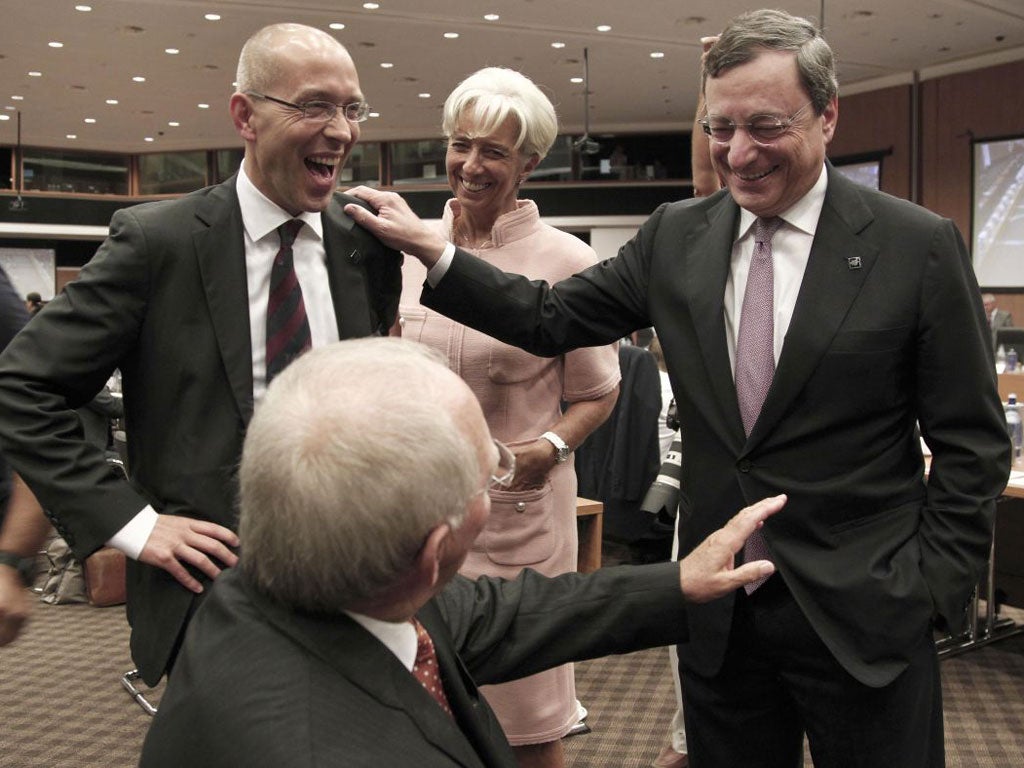Mario Draghi in lion's den: ECB head will confront German critics
Central banker insists bond buying plan for ailing eurozone states is not a blank cheque

The head of the European Central Bank (ECB), Mario Draghi, threw down the gauntlet to German critics of his plan to buy the government bonds of ailing eurozone countries yesterday by suggesting they should invite him to justify his decision in person before MPs in the Berlin parliament.
German anger over the issue reached boiling point last week after Mr Draghi unveiled the ECB's eurozone rescue plan to buy up unlimited amounts of short-term government bonds to help countries such as Spain and Italy to overcome high interest rates providing they agreed to strict controls.
Jens Weidmann, the president of the German Bundesbank, bitterly criticised the measure and said it was "close to state financing via the printing press" and meant that the ECB was assuming a political role.
Several German MPs also lambasted the decision, claiming that it was a back door to unlimited funding. Alexander Dobrindt, a right-wing eurosceptic Bavarian MP, labelled Mr Draghi a "counterfeiter". But yesterday, in an interview with Germany's left-leaning Süddeutsche Zeitung newspaper, Mr Draghi delivered a surprise response to his critics by offering to justify his decision before MPs with an appearance in the German Bundestag in Berlin.
"If the Bundestag were to invite me, I would gladly make an appearance… It would be a good opportunity to explain what we are doing," Mr Draghi said. "I have to do more to explain the steps we are taking."
The ECB president sought to allay German fears that his plans opened the door to the unlimited funding of struggling eurozone countries by insisting that his measures would be implemented only if the governments in question agreed to strict controls.
"Not to have acted would have been much more risky," Mr Draghi warned. "The obligations that the countries have to meet are the best insurance against risk."
Mr Draghi maintains that his plan fulfils the ECB's mandate to preserve price stability. He argued that failure to intervene would have left crisis countries locked in a vicious financial circle from which they would have been unable to escape even if they pursued sound economic policies.
He said the problem of rising interest rates would have simply worsened their predicament – so the ECB had to act. "The financial markets have to realise that the euro is irreversible," he insisted, adding that the ECB's new facility had already raised confidence in the single currency. "Fund managers are bringing their money back to Europe. This is good for the euro-area economy," he said.
Mr Draghi attributed the criticism of his plan to German history and the country's deep-seated fear of inflation that stemmed from the Weimar Republic and the ensuing Nazi era. He conceded that he and the German Bundesbank "had different opinions on how the euro crisis should be overcome".
Martin Schulz, the German president of the European Parliament, threw his weight behind the Draghi plan yesterday by declaring on a popular German television talk show: "What Draghi is doing is absolutely right in my view."
However, Volker Kauder, the parliamentary leader of Chancellor Angela Merkel's ruling conservative Christian Democrats, said the ECB plan was "very close to the edge" of what was permissible. Ms Merkel has not criticised the plan herself.
Gordon Brown: We could go way of Japan
The former prime minister Gordon Brown weighed into the eurozone debate yesterday with a warning that Europe was "threatening to go the way of Japan", doing enough to "stop disintegration, rather than start a recovery" to reverse the economic downturn. Mr Brown welcomed the European Central Bank's plan to intervene in the bond markets to aid struggling countries such as Spain. But he said it was not enough to solve the problem of growth.
Mr Brown also questioned the German focus on austerity. "A one-dimensional obsession with public debt ('if austerity is not working, we need more of it') has led Europe to underplay its underlying problems of low growth, diminished competitiveness and economic weakness," he warned.
Subscribe to Independent Premium to bookmark this article
Want to bookmark your favourite articles and stories to read or reference later? Start your Independent Premium subscription today.

Join our commenting forum
Join thought-provoking conversations, follow other Independent readers and see their replies